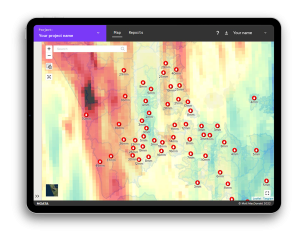Article by Maria Mingallon, Automation and Computational Design Global Lead at Mott MacDonald
Introduction:
Severe weather events, including frequent and devastating flooding, have posed significant challenges for communities around the world. In New Zealand, the recent impact of Cyclone Gabrielle has spurred the search for innovative solutions to manage flood risks. One such solution is the integration of Artificial Intelligence (AI) into flood management systems. In Piha, Auckland, a pioneering pilot project is underway, using AI to predict stormwater flooding and transform flood management practices. This blog post explores the benefits of AI in flood management, highlighting the Piha Flood Management System (FMS) as a prime example of the potential of this technology.
Predictive Capabilities of AI:
Located in a flood-prone area, Piha faces recurring flood events that have resulted in property damage, road closures, power outages, and the need for emergency evacuations. To address these challenges, Auckland Council developed the Piha FMS, incorporating emerging technologies such as Internet of Things (IoT) devices, rain radar, hydraulic modelling, and machine learning. By integrating these components, the FMS creates an integrated digital twin of the rainfall and flood forecasting system. It enables proactive, efficient, targeted, and evidence-based operational responses, significantly reducing simulation times and providing immediate insights for flood managers.

AI-powered Flood Forecasting:
Traditional hydraulic models often fall short in providing timely flood predictions, particularly during rapid rain events. By combining rainfall nowcasts and machine learning techniques, the FMS generates real-time stormwater flood prediction maps with remarkable speed. The machine learning model, trained using historical rainfall radar data and calibrated hydraulic model outputs, delivers accurate flood forecasts in just seconds. This AI-powered solution significantly outperforms traditional methods, which would require approximately hours to achieve the same results and are not suitable for flash flooding catchments such as Piha. Advancements like this enable authorities to make critical decisions promptly, such as road closures and evacuations, ultimately reducing the risk to life and property.
Moata Smart Water Platform:
The FMS operates through the Moata Smart Water platform, which consolidates real-time data, forecast information, and analytical pipelines. This digital twin platform provides flood managers with a centralised source of truth, offering geospatial visualisation of flood-related information. Real-time data, including rain gauge measurements, radar data, service requests, and data from cameras and level sensors, is presented in an easily accessible interface. By leveraging this comprehensive platform, flood managers can optimise their flood models, assess economic losses, and improve communication with relevant stakeholders.
Benefits and Future Prospects:
The successful implementation of the FMS in Piha has yielded remarkable outcomes for flood management. Improved rainfall estimation, real-time flood forecasting, and enhanced communication have empowered authorities in Auckland to adopt proactive flood response strategies. The integration of AI not only expedites flood prediction but also allows for the assessment of flooding probabilities, enabling authorities to mobilise mitigation efforts with greater confidence. With the potential to integrate with other systems, such as transportation digital twins and public communication channels, the FMS offers a comprehensive approach to flood management.
AI is a game-changer in flood management as demonstrated by the implementation of FMS in Piha. By harnessing the power of machine learning and digital twin platforms, flood managers can make data-driven decisions, enhance resilience, and save lives. The successful application of AI in flood forecasting serves as a blueprint for future flood management systems worldwide. As extreme weather events continue to intensify, embracing AI technology becomes crucial in minimising the devastating impacts of flooding and protecting communities from harm.
Read more: https://www.mottmac.com/digital/moata-smart-water-learn-more or https://www.mottmac.com/views/flood-visualisation-and-the-importance-of-weather-event-modelling






